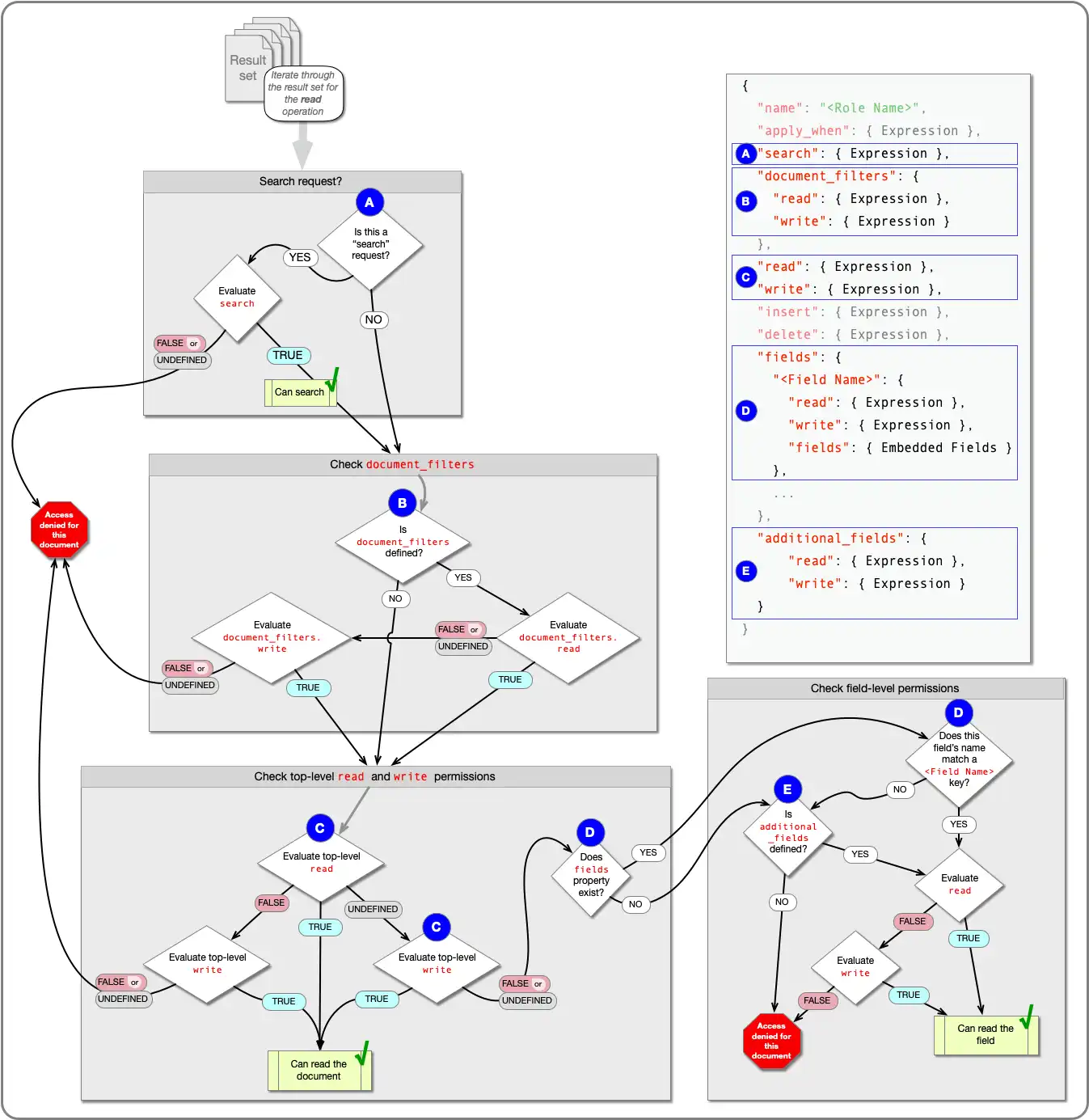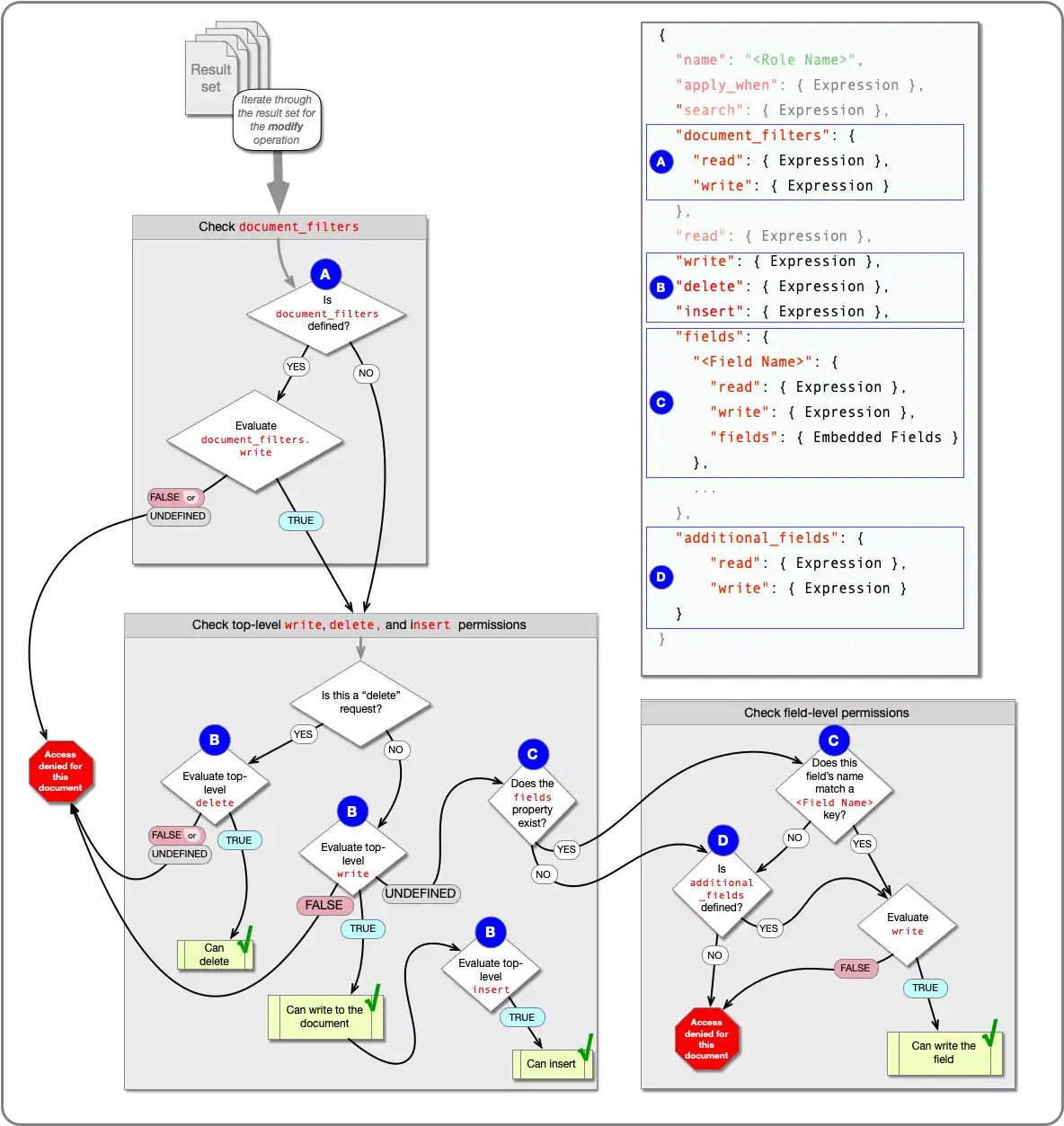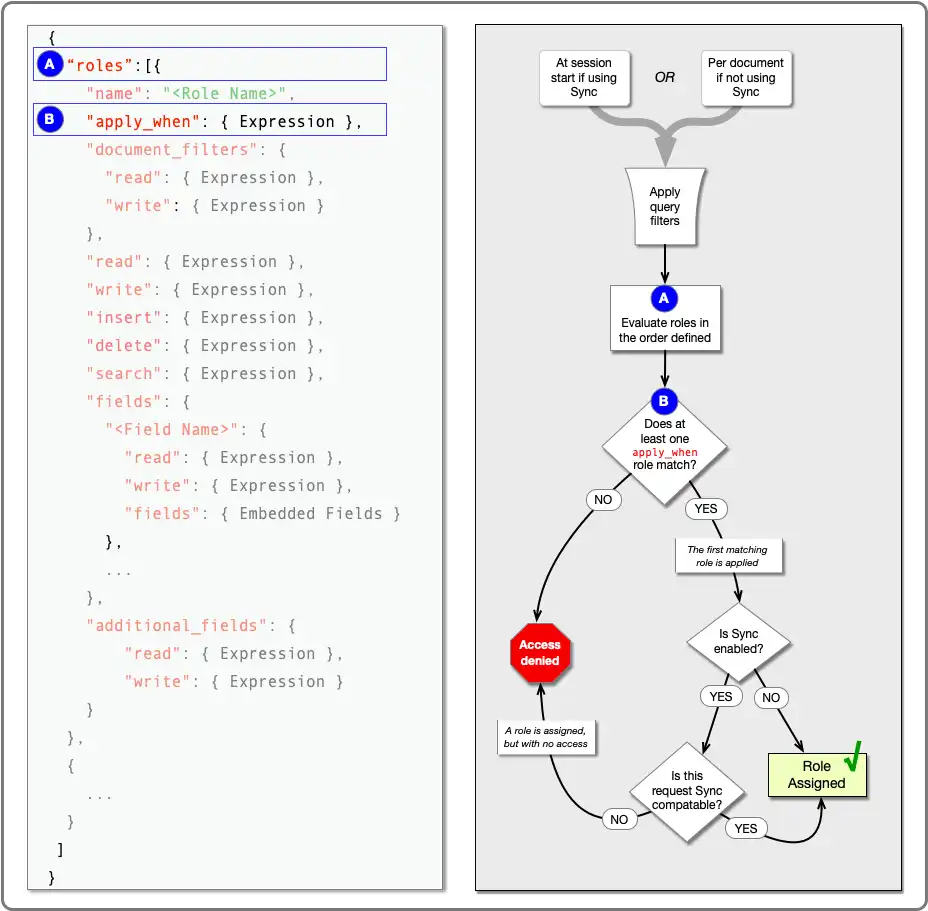Docs Home → Atlas App Services
Role-based Permissions
On this page
Overview
You secure your App's data by defining roles that are automatically assigned to incoming user requests and Device Sync sessions. Each role has fine-grained data access permissions and dynamic conditions that determine when the role applies.
For examples of how you might configure permissions for common scenarios with Device Sync, see the Device Sync Permissions Guide.
What are Permissions?
A permission is a status that Atlas App Services assigns to individual users to control what they can and cannot do with your app's data. App Services uses both document-level and field-level permissions:
Document-level permissions control whether a user can insert, delete, modify, and search for a specific document in a MongoDB collection.
Field-level permissions control whether a user can read or write the data in specific fields of a document.
Document-Level Permissions
A role's document-level permissions determine which actions that affect the entire document can be performed. These permissions always apply to the entire document regardless of the content. A role can have the following document-level permissions:
Insert: You can insert new documents.
Delete: You can delete existing documents.
Search: You can search for the document using Atlas Search.
Field-Level Permissions
A role's field-level permissions determine whether a user can read or write fields within the document. These permissions only affect the field they apply to, so a user can have read or write access to only a subset of the entire document.
You can define field-level permissions for specific fields and default read/write permissions for any additional fields that you don't explicitly define.
Read Permissions Flowchart
The following diagram shows how App Services determines whether a user can read a given document:

Write Permissions Flowchart
The following diagram shows how App Services determines whether a user can write a given document:

Roles
A role is a named set of permissions that a user may have for documents in a MongoDB collection. A role has an "apply when" expression that determines whether App Services should assign the role to a user. Roles also have a set of document- and field-level permissions that a user has when assigned the role.
App Services only commits operations that a user is authorized to do based on their assigned role. If a role does not have permission to read a document or some of its fields, App Services omits the document or fields from the results.
Example
Consider a collection named employees where each employee has their own
document with all of their employment data. This collection might have two
roles: Employee and Manager. We're not using Device Sync, so App
Services selects a role on a per-document basis.
If a user requests their own document, their role is Employee. An employee can read and write their own data but can't create or delete their own documents.
If a user requests a document for someone whose name is listed in the user's
managesarrays, their role is Manager. A manager can read and write their direct reports' data and can create and delete their documents.If a user is neither an Employee nor a Manager for a given document, then they have no role and cannot read, write, or search that document.
How App Services Assigns Roles
App Services assigns roles at different times depending on whether you're using Device Sync (Flexible Mode) or not.
When using Device Sync, App Services assigns roles at the start of a Sync session for each collection to be synced. A Sync session is the period of time between opening and closing a Sync connection.
When not using Device Sync, App Services assigns roles on a per-document, per-request basis.
Whether using Device Sync or not, you can define a set of roles that are specific to collections and default roles that apply to any other unspecified collection. To assign a role, App Services evaluates each role's "apply when" expression in the order that you specified them. The first role whose "apply when" expression evaluates to true becomes the assigned role. If no role matches, access is denied.
The set of evaluated roles for a given request or Sync session depends on the collection the user is accessing. If you defined any collection-level roles for the collection, the collection-level roles are evaluated. Otherwise, the data source's default roles, if any, are evaluated.
App Services does not "fall back" to default roles if no collection-level role applies. If any collection-level role is defined, only collection-level roles are evaluated. Default roles are evaluated if and only if no collection-level roles were defined.

Without Device Sync
When not using Device Sync, App Services dynamically assigns roles for every document. The user is assigned a separate role, or no role, for each document that matches the incoming query.
First, your App evaluates and applies filters and then runs the query.
Example
The following request causes App Services to evaluate a role for every document in the
restaurants collection where the city field is set to "Chicago":
db.restaurants.updateMany( { "city": "Chicago" }, { "$set": { "city": "Chicago, IL" } } );
For each document returned by the query, your App evaluates possible
roles in role order and assigns the first applicable
role, if any. A role applies to a given document if its "apply when"
expression evaluates to true when run against
the document.
Example
An employee will always be on their own team, so both the Employee and Teammate roles apply to them for their own document. However, they can use only one role, so we want to use Employee because it's more specific.
To configure this, specify Employee earlier than Teammate in the collection's role definitions:
With Device Sync
When using Device Sync, App Services assigns roles at the beginning of each Flexible Sync session for each synced collection. The role determines which permissions apply to each collection for the duration of a session.
App Services assigns at most one role per collection. If you did not specify roles for a given synced collection, App Services uses the default roles instead. If no role applies for a collection, the user cannot sync (or read or write) any entries in that collection.
A role stays assigned for the duration of the session. If something relevant to a user's session role changes in the middle of the user's session, the user is not assigned an updated role until they start a new session. For example, if the user's metadata or the role's "apply when" expression changes, the user continues to use the existing role for that collection until the next time they start a session.
There are some special considerations when using Device Sync with regard to the permissions system. See Device Sync-Compatible Permissions.
For a guide to setting up Flexible Sync with common permissions models, see the Device Sync Permissions Guide.
Apply When Expressions
A role's "apply when" expression is a rule expression that determines whether the role should be assigned.
You can use expression variables to make roles dynamic. For example, you can use the
%%user expansion to refer to the specific user that issued the
request. This lets you customize your data access permissions on a per-user
basis.
When not using Device Sync, you can refer to the current document for which a
role is being assigned. For example, you can use %%root. This
lets you customize your data access permissions on a per-document basis.
Document Filters
The role's document_filters expressions determine whether the role's
subsequent document- and field-level permissions may be evaluated at all. This
is required for Device Sync.
Note: App Services evaluates document filters on a per-document basis. These are not to be confused with the top-level query filters.
Role Order
The roles for a given collection each have a position that determines the order in which they are evaluated and applied. Each role's apply when expression is evaluated in role order until a role applies or no roles remain.
A user may only have one role per document in a given query. Role order determines which role applies in the event that multiple roles' "apply when" expressions are true. Therefore, when defining roles, put the most specific roles first.
Sync Compatibility
If Device Sync (Flexible Mode) is enabled, an assigned role must be sync compatible. See Sync-Compatible Roles for details.
Define Roles & Permissions
You can configure your app's data access rules from the App Services UI or by deploying configuration files with App Services CLI:
Note
Security Consideration for App Services Role-based Permissions
While Role-based Permissions and Filters can hide specific documents and fields within a collection there is a potential that data can be exposed if the system allows arbitrary queries to access the collection.
For example, queries or functions that raise errors depending on the values stored in a collection (such as division-by-zero errors) may reveal information about documents, even if a role or filter prevents the querying user from viewing documents directly. Users may also make inferences about the underlying data in other ways (such as by measuring query execution time, which can be affected by the data's distribution).
Be aware that this is possible and audit your data access patterns where neccessary.